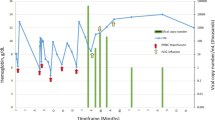Abstract
We report the course of dicygotic twins born preterm after 29 4/7 weeks of gestation due to congenital Parvovirus B19 infection causing fetal hydrops with severe anemia in one infant in whom intrauterine transfusion was impossible to perform and high levels of viremia in both infants. After being discharged, they were readmitted at 3 months of age with critical aplastic crisis. Therapy with intravenous immunoglobulin infusion resulted in decreasing viremia followed by stable hemoglobin levels in both infants.
Conclusion: Intravenous immunoglobulin treatment of congenital pure red cell aplasia due to Parvovirus B19 infection in preterm infants seems to be effective to introduce viral remission and to normalize erythropoiesis.


Similar content being viewed by others
Abbreviations
- B19V:
-
Parvovirus B19
- IVIG:
-
Intravenous immunoglobulin
- PCR:
-
Polymerase chain reaction
- Rbc:
-
Red blood cell
References
Blaeser F, Kelly M, Siegrist K et al (2005) Critical function of the CD40 pathway in parvovirus B19 infection revealed by a hypomorphic CD40 ligand mutation. Clin Immunol 117:231–237
Bonvicini F, Puccetti C, Salfi NC et al (2011) Gestational and fetal outcomes in B19 maternal infection: a problem of diagnosis. J Clin Microbiol 49:3514–3518
Brown KE, Young NS (1995) Parvovirus B19 infection and hematopoiesis. Blood Rev 9:176–182
Chisaka H, Morita E, Yaegashi N, Sugamura K (2003) Parvovirus B19 and the pathogenesis of anaemia. Rev Med Virol 13:347–359
Crabol Y, Terrier B, Rozenberg F et al (2013) Intravenous immunoglobulin therapy for pure Red cell aplasia related to human parvovirus B19 infection: a retrospective study of 10 patients and review of the literature. Clin Infect Dis 56(7):968–977
Enders M, Weidner A, Zoellner I, Searle K, Enders G (2004) Fetal morbidity and mortality after acute human parvovirus B19 infection in pregnancy: prospective evaluation of 1,018 cases. Prenat Diagn 24:513–518
Ergaz Z, Ornoy A (2006) Parvovirus B19 in pregnancy. Reprod Toxicol 21:421–435
Heegaard ED, Brown KE (2002) Human parvovirus B19. Clin Microbiol Rev 15:485–505
Liefeldt L, Plentz A, Klempa B et al (2005) Recurrent high level parvovirus B19/genotype 2 viremia in a renal transplant recipient analyzed by real-time PCR for simultaneous detection of genotypes 1 to 3. J Med Virol 75:161–169
Tavil B, Sanal O, Turul T, Yel L, Gurgey A, Gumruk F (2009) Parvovirus B19-induced persistent pure red cell aplasia in a child with T-cell immunodeficiency. Pediatr Hematol Oncol 26:63–68
Conflict of interest
The authors declare that they have no conflict of interest.
Author information
Authors and Affiliations
Corresponding author
Additional information
Communicated by David Nadal
Rights and permissions
About this article
Cite this article
Lejeune, A., Cremer, M., von Bernuth, H. et al. Persistent pure red cell aplasia in dicygotic twins with persistent congenital parvovirus B19 infection—remission following high dose intravenous immunoglobulin. Eur J Pediatr 173, 1723–1726 (2014). https://doi.org/10.1007/s00431-014-2420-5
Received:
Revised:
Accepted:
Published:
Issue Date:
DOI: https://doi.org/10.1007/s00431-014-2420-5




